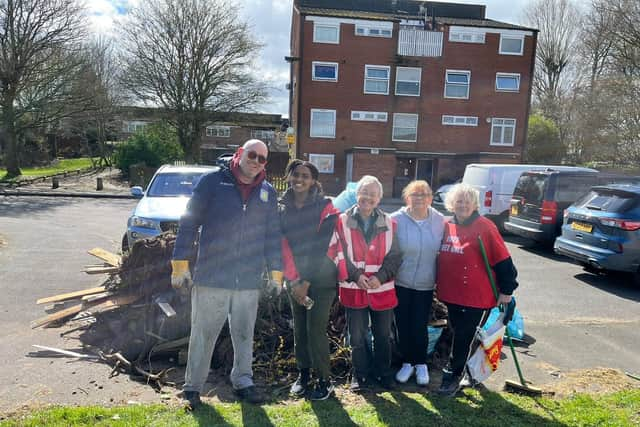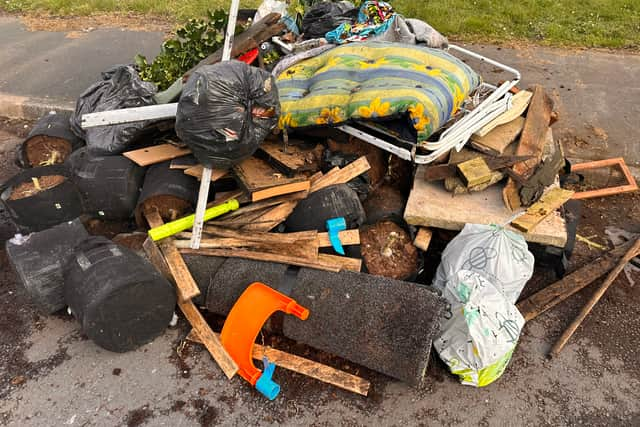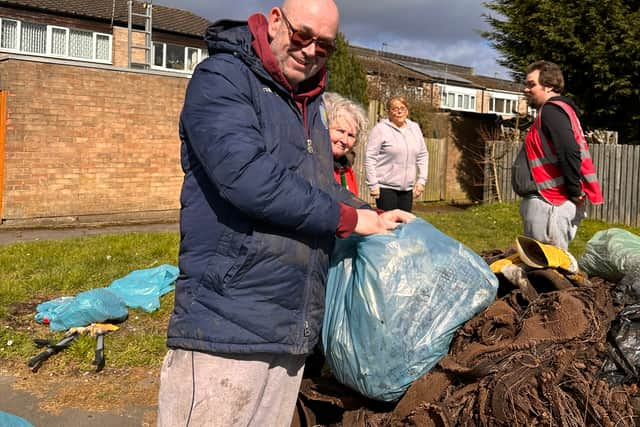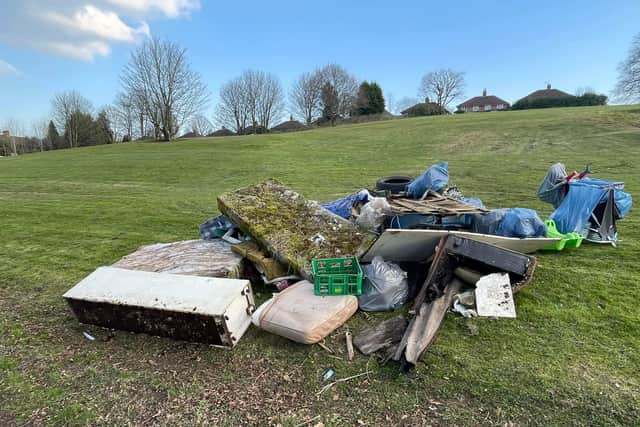Earth Day 2023: Meet the Birmingham communities leading litter-picking and clean-up events
and live on Freeview channel 276
Paul Preston, Labour Party member and admin of the Bartley Green Bulletin (a Facebook page with over 600 members) is an active member of his local community.
Depending on requests, he will weekly lead a team of volunteers to do a clean up, which takes an average of two to three hours.
Advertisement
Hide AdAdvertisement
Hide AdPaul and his team’s cleaning work involves not only picking up litter, but also clearing space, trimming branches, and removing rubbish - including items like mattresses from brooks, and upon request, they also coordinate with the council to dispose of the waste.
Paul acknowledges that climate fatigue is a real thing but encourages locals to get involved in community events if they so want to, he said : “Watch what we do and if you want to come along and join us by all means do.”
Last year, a study commissioned by Cornish-based lager brand Korev, found out that out of 2000 adults, almost half admitted to littering. The Woodgate Valley resident talked to BirminghamWorld about the importance of education in terms of the importance of litter picking,
“It’s education and it’s training. If they don’t know or haven’t been brought up in a way that they understand the environment they won’t care for the environment. If we can educate people on the environment, on what to do and where to go, that will have a massive impact for the area and for themselves.”
Advertisement
Hide AdAdvertisement
Hide AdThe Bartley Green Bulletin admin recognises that littering is a major problem across Birmingham. “They haven’t been taught to put rubbish in their pocket and take it home and put it in the bin or go to the nearest bin.”
Paul suggests that due to the current state of the economy people may find themselves ‘too busy’ and so they find themselves too time-strapped to be part of a local community, he said: “When I was growing up I knew every neighbour but now people keep to themselves. But when it comes to myself and my team, we try to open that up and get the old communities together.”
“A lot of times climate-based news is people protesting and it’s negative, and they’re not looking at the other side of it where people are out there cleaning up areas. News always seems negative when you’re watching it on the telly.”


With Earth day here (on Saturday, April 22), Preston is joining the Weoley Castle community for their Earth Day Festival on a stall, educating people and bringing awareness. about the work they do in local areas like clean ups.
Advertisement
Hide AdAdvertisement
Hide AdJanelle Kolas, the event organiser of the Earth day festival in Weoley Castle also spoke to BirminghamWorld about the importance of taking part in community work. She has been litter picking regularly for two years.
“A lot of litter in Birmingham is unfortunately in greenspaces in areas that can really harm wildlife. I have decided to put on an Earth Day Festival as a response to my own litter picking in Weoley Castle Square from 11am-2pm because you see so much litter and think how in the world are we solving this problem.
“The easiest way is to get children excited about nature and the environment. We’re having about 20 different tables in the square in Weoley Castle and this is in partnership with Saint Gabriel’s centre. It’ll be a whole afternoon of fun activities for families so they can teach their kids about the environment.”
Janelle also recognised why some might feel discouraged to take part with the negative messages carried about climate change in news. “In terms of climate change, it can get people depressed, a doomsday scenario, but you can protect your own environment. While we can’t change climate change, that’s for government what we can do is work together to protect our wildlife.”
Advertisement
Hide AdAdvertisement
Hide AdJanelle emphasised the importance of doing what you can do, not worrying about what you cannot. Similarly, James Painter, head of the Journalism Fellowship Programme at the Reuters Institute for the Study of Journalism, commented that it is the role of the government to inspire hope and motivate climate action.


He said: “Journalists should prioritise accurate, engaging and relevant reporting of the many aspects of the climate change story. However, it is now the case that compared to the past, major science organisations like the IPCC are putting much more emphasis on the array of solutions that are now available at the international, country, regional and individual level to address and reverse GHG emissions.
“So journalists should cover these solutions with much more frequency and depth, and explore how different communities at the local level are attempting to reduce their emissions.”
As climate change continues to be a pressing issue, the media has a crucial role in informing the public about its impacts and potential solutions. However, a new concern has emerged - the desensitisation of climate news.
Advertisement
Hide AdAdvertisement
Hide AdWhile it’s essential to cover climate-related topics, there is a growing responsibility to be cautious with the language used in reporting. James said: “Journalists should always be careful with the language they are using around climate change, and the Guardian’s style guide for example is a helpful step.
“They should strive to avoid alarmist language, as too much doom and gloom reporting is shown by research to have a negative effect for some audiences (and remember there is a huge range of audience types out there).”
He added: “For example, results from focus groups show that while disaster narratives and images may be good at attracting attention, they are not so good at motivating genuine personal engagement or behaviour change.
“Strong appeals to fear are unlikely to avert danger and can generate defensive avoidance (“this is too scary to think about”) or worries of being pressured or constricted (“they are trying to manipulate me”). In contrast, images of people like the target audience doing things to counter climate change, can be effective for promoting engagement with the issue.”


Advertisement
Hide AdAdvertisement
Hide AdBirminghamWorld spoke to Joanna Braniff and Alisdair Naulls from The Rivers Trust about taking action involves being aware of the language you use but also recognising the impact of communities.
Joanna said: “Language is key and language changes, facts remain the same but language changes. Human communities have also changed as we now have online communities which are great think spaces… If you actually want to achieve action, that’s human beings together in one space. Humans are more likely to take action when they get that human support.”
Joanna, the communication officer for Ireland (and Northern Ireland) at The Rivers Trust, emphasised the significance of creating an emotional bond to promote climate action. She suggested that rather than solely educating people about scientific river facts, it’s vital to evoke memories and emotions associated with local rivers to encourage people to take action.
Alisdair agreed with Joanna and said: “It’s just nudging people to remember to remember. Emotion plays a huge part, it drives science and data collection. I work on a big project called the Preventing Plastic Pollution project and I was just reading some feedback forms and there are a lot of people that haven’t forgotten to pick up litter as they go on a river walk but they never really stop to examine it.”
Advertisement
Hide AdAdvertisement
Hide AdAccording to Alisdair, it is crucial to remind people of their connection to nature and nudge them to recall it. He reinforced that when people care about something, they are more likely to take action towards change.


Deborah Phelpstead, Environmental Manager, and Neva Mowl, Environmental Officer, both at BCU, also shared their insights in an interview with BirminghamWorld. Neva said: “We are helping people to understand the impacts of climate change and identify what they can do to reduce those effects through their job and community, as well as in their personal lives, and support those people to encourage others to take action.”
Both Phelpstead and Mowls work to make Climate Change messages palatable, by getting people to focus on gains rather than losses. Deborah said: “It can be very tricky to strike that balance as you don’t want to bombard people and make people feel completely overwhelmed but you still want to convey the importance of the challenge of what’s going on.”
She added: “One thing we try to do is understand the audience and to try to encourage action and change through the interests they already have. You want to be for something rather than against something but you still need to put across the seriousness of the situation but you also need to look to the future. It is very complicated and I don’t know if anyone has got that balance right.”
Comment Guidelines
National World encourages reader discussion on our stories. User feedback, insights and back-and-forth exchanges add a rich layer of context to reporting. Please review our Community Guidelines before commenting.